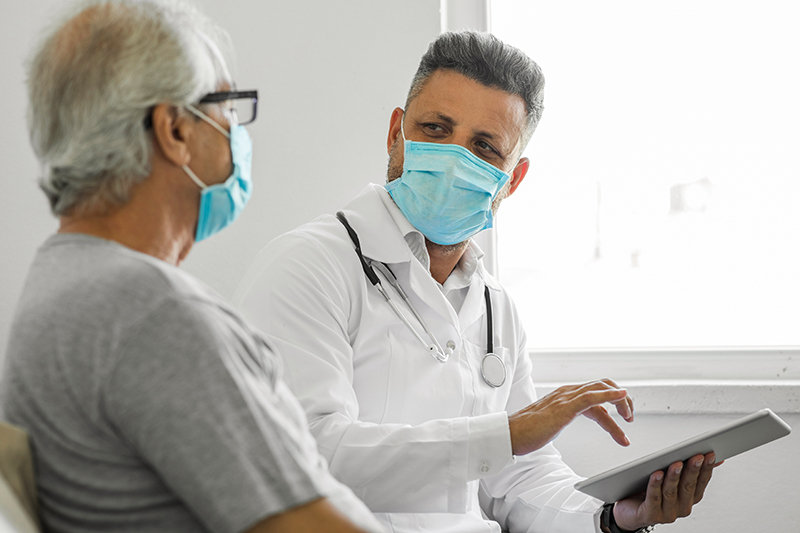The start of the New Year is a perfect time to evaluate your health goals and make some resolutions. Don’t be tempted by crash diets! There are other ways to improve your health for the long-term. Find out some of the healthiest resolutions you can make.
How to quit smoking
One of the best things you can do for your health is to quit smoking. It may come as no surprise that cigarette smoking is the number one risk factor for lung cancer. However, smoking can also lead to a host of other cancers including liver cancer and colorectal cancer.
In addition, smoking is associated with chronic obstructive pulmonary disease or COPD, an increased risk of heart attack and stroke, increased risk of diabetes, accelerated bone loss in elderly patients, reproductive health issues and increased risk of upper respiratory illnesses including COVID-19.
“Cigarette smoking has a multi-system effect on basically every organ in the body,” said Bridgeport Hospital pulmonologist Augustine Andoh-Duku, MD.
Smokers can start to feel the positive effects of quitting in just a few days with improved taste and smell. Over time, it is possible to reverse some of the damage caused by smoking. For example, the risk of heart attack and stroke goes down in just five years.
Dr. Andoh-Duku said the first step to quitting smoking is having your ‘why.’ Some patients find enough motivation in simply knowing the health risks involved. For others, having more money in their pocket is a good motivator. No matter your reason to quit, you do not have to do it alone.
“Tell your family and friends about your plan to quit,” Dr. Andoh-Duku said.
Loved ones will keep you motivated and help you avoid smoking triggers. Patients can also get support from their primary care clinician or a specialist who can offer medical therapies or behavioral counseling.
How to start exercising
It is no secret regular physical activity is good for your body. The American Heart Association recommends 30 minutes of moderate physical activity per day. If you try to do too much too soon, you could be prone to injuries.
Sean Peden, MD, Greenwich Hospital and Yale Medicine orthopaedic surgeon said he sees acute exercise related injuries every January. By February, patients tend to develop overuse injuries like tendinitis and stress fractures. In order to stay safe, he recommends patients take stock of their limitations before they get started.
“What worked for you in your 20s might not work for you in your 40s,” Dr. Peden said.
If it has been a while since you last exercised, Dr. Peden recommends talking to your primary care doctor first to get a baseline check on your cardiovascular health. It may also be a good idea to consult a clinician with experience in sports medicine, or a physical therapist depending on your needs.
The second step is to go slow. The first few times you work out, you might only exercise for 20 minutes. Inspect all exercise equipment and look at your sneakers. If the bottom of your shoes are breaking down or the tread is gone, replace your sneakers with a new, supportive pair.
Lastly, Dr. Peden said stretching is “essential” to help with chronic conditions such as low back pain. Avoid static stretches and instead try dynamic stretches such as yoga.
Remember, it may be uncomfortable when you work out. Muscle soreness is normal and a sign your body is working hard. However, Dr. Peden warns, “you shouldn’t feel pain in your joints when you exercise.”
In the event you are injured, remember the term “RICE,” which stands for Rest, Ice, Compress and Elevate. If you don’t get better, it is time to see a doctor.
Get better sleep
A good night’s sleep is just as important as getting enough exercise and can affect long-term health, cognition and even the immune system.
“Our immune response is enhanced by good quality sleep and getting sufficient sleep,” said Amit Khanna, MD, FAASM, medical director of the Lawrence + Memorial Sleep Center. “Insufficient sleep has been shown to have an impact on how you mount an immune response, even when getting vaccinations.”
Not to mention, poor sleeping habits impact performance at school or work, causes irritability, fatigue and restlessness.
Most adults need seven to nine hours of sleep per night. Getting quality sleep is just as important as the quantity. To get a good night’s rest, Dr. Khanna recommends making your bedroom a sanctuary and allowing your body enough time to power down. Avoid caffeine, alcohol and nicotine at least two hours before bed, and put down the electronics.
“The blue light coming off of screens is suppressing your body’s ability to release melatonin, and that’s what your body needs to shut down and go to sleep at night,” said Dr. Khanna.
If it is too difficult to maintain a healthy sleep routine, it might be time to talk with a sleep specialist. Some patients may benefit from medication. However, Dr. Khanna said others might benefit from cognitive behavioral therapy, which gives patients behavioral modification techniques that help them stay asleep without medication.
Importance of health screenings
One of the easiest ways to get on track with your health goals is to schedule a visit with a primary care clinician. They can offer patients medications, support, resources and referrals to specialists if needed.
Even ‘healthy’ patients can benefit from a yearly exam. For example, most patients with high blood pressure will not have symptoms. The proper screenings will catch that, giving patients a chance to make changes that can benefit them for years to come.
“There’s a lot of evidence that people who check in with their doctor on a regular basis tend to have more knowledge of their health problems and they consequently tend to have better outcomes,” said Northeast Medical Group primary care clinician, Greg Mulvey, MD.
An annual exam is a great time to get seasonal vaccinations like the flu shot. Older patients may benefit from vaccinations for pneumonia, RSV and shingles. Still on the fence about whether to get a COVID-19 booster? Dr. Mulvey said a primary care clinician would answer any questions you may have.
Primary care clinicians will also be able to help patients in need of mental health care, screening for signs of anxiety and depression.
“Oftentimes we will take the reins. We recognize you may need more specialty care but in the meantime, you’re suffering right now, here’s what we can do today to start you on the path to some recovery,” said Dr. Mulvey.
Don’t have a doctor? Find one near you.





